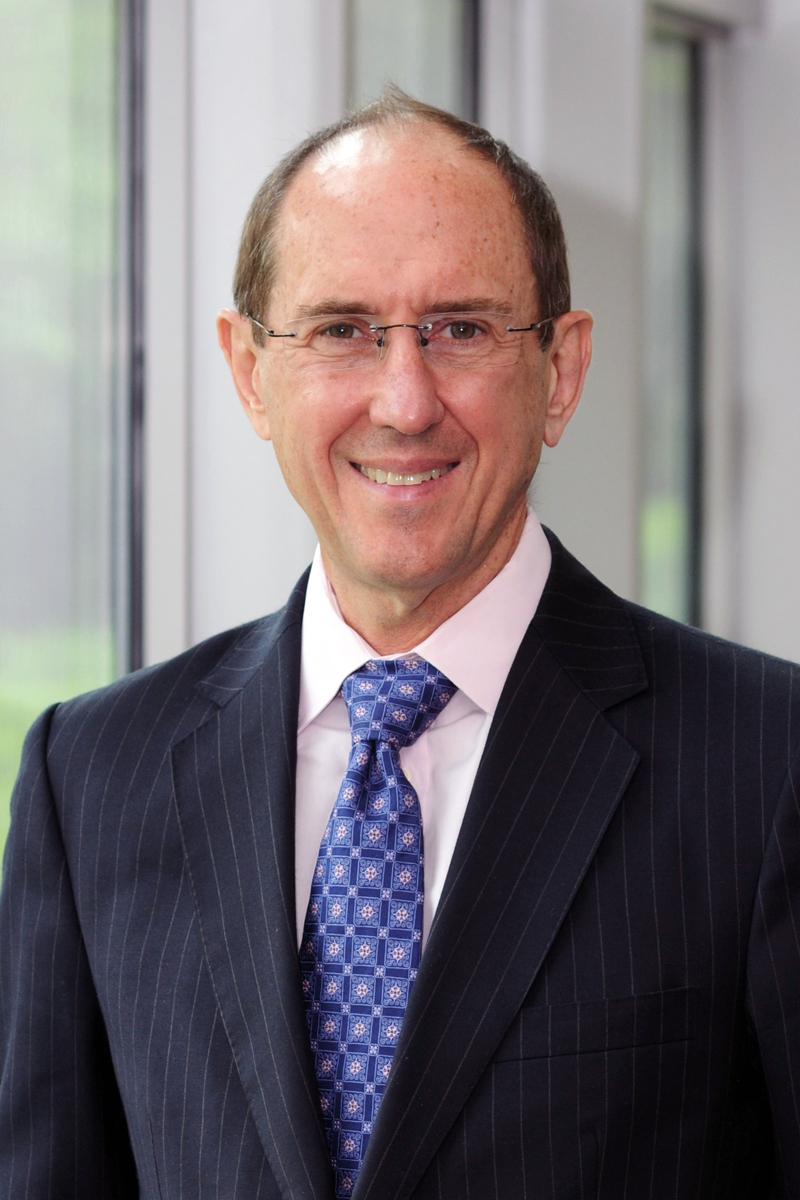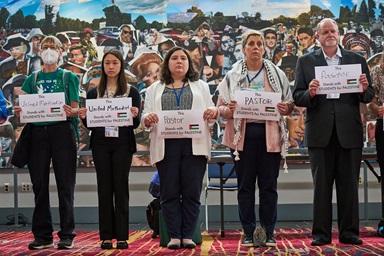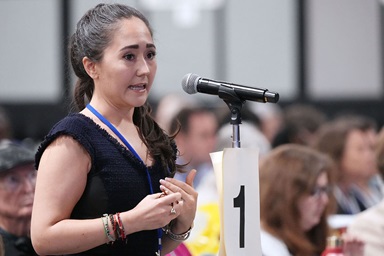Key points:
- Wespath Benefits and Investments, The United Methodist Church’s pension agency, recently released its latest sustainable investment report for 2021-22.
- The report highlights how Wespath achieves success by investing in alignment with church values.
- Wespath’s approach to sustainable investing withstands recent critiques of investors that integrate the consideration of environmental, social and governance factors.

Photo courtesy of Wespath.
Commentaries
Wespath Benefits and Investments recently released its latest sustainable investment report. Highlighting our work over the last two years, it details how Wespath pursues competitive long-term investment returns on behalf of the church’s stakeholders in alignment with our shared values.
This report comes at an interesting time in the sustainable investment world. Significant media attention has been directed toward investors that consider environmental, social and governance (ESG) factors in their decision-making. Numerous pundits and public officials have sought to discredit these investors. Generally, these critics argue that ESG is politicized, “woke” or ineffective in achieving market returns.
Last year, I wrote in a different publication about my perspective on ESG and why Wespath’s approach discredits much of the criticism. Since then, the cacophony of anti-ESG rhetoric has grown louder and more coordinated. Several U.S. states have passed legislation seeking to restrict their public funds’ ability to consider ESG, and at least one presidential candidate has made the topic an early campaign talking point.
Wespath participants and institutional investors have noticed. We have received multiple questions about how ESG aligns with our fiduciary responsibilities to church employees and the related organizations who entrust their assets to Wespath.
At Wespath, we view the consideration of ESG factors as one element of a comprehensive approach to achieving strong, long-term investment returns. We have seen benchmark-beating performance from investment strategies focused on environmental and social themes. Through shareholder engagement, we have made meaningful progress toward a more sustainable and resilient economy.
Some common ESG factors on investors’ minds are topics such as energy efficiency, waste management, human capital management, workplace conditions and respect for human rights. Understanding how companies address these issues helps us assess the risks that might affect the companies in which we invest.
ESG also helps us consider opportunities in the investment landscape. Companies that offer solutions to sustainability challenges may see great growth potential as demand for their products or services rises. Similarly, companies that adapt to shifts in consumer demand can build long-term resiliency and stability.
Sustainable investing is not one-size-fits-all. We neither rely on a single source of third-party ESG data or ratings nor make investment decisions based on these ratings. Our unique approach to sustainable investing aligns with our Methodist values and our understanding of market risks and opportunities.
Our “Sustainable Economy Framework” describes our vision for a sustainable economy characterized by long-term prosperity for all, social cohesion and environmental health. We believe an economy with these traits will create healthy financial markets and resilient companies that, in turn, will support our participants and institutional investors in reaching their long-term financial goals.
Our results show that Wespath’s attention to social and environmental considerations has contributed positively to the financial security of participants and institutional investors. Our Positive Social Purpose Lending Program has delivered competitive investment returns while supporting the creation or preservation of over 52,000 units of affordable housing since its inception in 1990.
Likewise, we have witnessed positive results from investment strategies that use an environmental lens. Three of our public-equity strategies with an environmental lens have delivered strong returns by identifying companies prepared for the ongoing low-carbon transition.
As investors and shareholders. we also use our influence to enter constructive dialogues and offer suggestions to companies, asset managers and policymakers. These conversations, which are often called “engagements,” are another way we work to achieve our Sustainable Economy Framework and advocate for more sustainable practices and policies that will benefit our stakeholders.
Unlike investing, however, success through engagement is more difficult to quantify. We do not have a parallel universe that allows us to compare investment results absent the investment community’s efforts to engage on corporate and public policy. Nevertheless, we strongly believe our engagement efforts bring about real change. For instance, Wespath helped lead an engagement with Dollar General about workplace safety policies because nearly 50 people had been killed at the company’s stores since 2014. The engagement eventually led a collaborating investor to file a shareholder resolution calling for an independent auditor to evaluate the company’s policies, which passed with majority support on the first attempt.
Subscribe to our
e-newsletter
By leading engagements and taking formal leadership roles in coalitions with focuses ranging from climate change to opioid mitigation, Wespath has been influential on issues that matter deeply to our participants and institutional investors and have clear economic and investment implications. Collaborative initiatives and strategic partnerships elevate these engagements and bring the United Methodist voice to the global table.
Wespath does avoid certain investments due to ethical concerns or because these investments are subject to excessive sustainability-related financial risks. Crucially, Wespath’s ethical exclusions align with The United Methodist Church’s Social Principles and ensure we do not invest in companies deriving significant revenue from products or providing services antithetical to Methodist values. This is a relatively small group of companies, and we closely track how these exclusions affect the performance of our funds.
In the face of clear indications that our approach benefits our stakeholders, I remain perplexed by the anti-ESG rhetoric spreading throughout the country. Take, for example, the “Government and Corporate Activism” law recently enacted in Florida. The law states that any party investing on behalf of the State of Florida must focus exclusively on “pecuniary factors,” which it defines as:
“…a factor … expected to have a material effect on the risk or returns of an investment based on appropriate investment horizons consistent with applicable investment objectives and funding policy. The term does not include the consideration or furtherance of any social, political, or ideological interests.”
Using this definition, I firmly believe Wespath’s application of the Sustainable Economy Framework and consideration of ESG factors aligns with the Florida legislation. All efforts associated with our framework are “pecuniary” in that the ultimate objective is to mitigate material risks, find great investment opportunities and deliver strong investment returns over a long-term horizon. Unfortunately, though, I expect the law will lead to more confusion and heated debate about what ESG really is and why investors consider it in the first place.
This debate can be frustrating, but it will not deter our efforts to serve our participants and institutional investors.
Our new report details two years of sustainable investing. I remain confident that our sustainable investment efforts will promote progress in achieving a healthy economy and supporting our participants and institutional investors well into the future.
Zellner is chief investment officer for Wespath Benefits and Investments, an agency of The United Methodist Church.
News media contact: Tim Tanton or Joey Butler at (615) 742-5470 or newsdesk@umcom.org. To read more United Methodist news, subscribe to the free Daily or Weekly Digests.
Like what you're reading? Support the ministry of UM News! Your support ensures the latest denominational news, dynamic stories and informative articles will continue to connect our global community. Make a tax-deductible donation at ResourceUMC.org/GiveUMCom.



